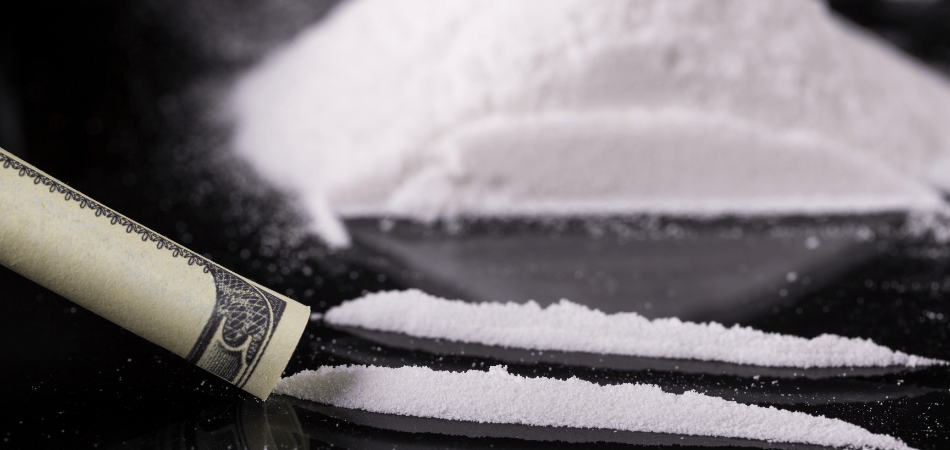Last Updated:
February 14th, 2025
Cocaine addiction
Cocaine in the UK
A recent study reveals that 2.7% of British adults, roughly one in 40 people, use cocaine, marking the UK as the highest consumer of the drug in Europe, second only to Australia. This alarming statistic highlights a growing concern that stretches far beyond recreational use.
As usage rates rise, so too does the potential for addiction and a whole range of negative outcomes. The broader impact of this trend is a stark reminder of the ongoing drug crisis across the country.

Why is cocaine frequently used in the UK?
Much of the frequent cocaine use in the UK has been linked to the country’s heavy drinking culture. It’s been reported that many users turn to cocaine because it can dampen the effects of alcohol, allowing them to drink more without feeling as drunk.
But, there are other factors contributing to its rise. Drug gangs from South America and beyond have developed more sophisticated methods of smuggling the drug into the UK, leading to a higher supply.
With more cocaine entering the country, prices have dropped from $178 per gram (around £135 at the time of writing) to $110 (around £83 at the time of writing) according to Statista. While still expensive, this reduction allows more frequent use among those who could already afford it.
What makes cocaine so addictive?
Cocaine is highly addictive due to the way it affects the brain’s reward system. When someone uses cocaine, it triggers a massive release of dopamine, the “feel-good” chemical, which creates intense feelings of euphoria and increased energy. However, this rush is short-lived, leading users to crave more to maintain the high.
Over time, the brain becomes reliant on cocaine to feel pleasure, as natural dopamine production is reduced. This makes it increasingly difficult to feel good without the drug. The combination of intense euphoria and strong cravings makes cocaine addiction both rapid and difficult to overcome.
What is cocaethylene?
Cocaine is dangerous not only on its own but also when mixed with alcohol due to the formation of a substance called cocaethylene. This chemical forms in the liver when cocaine and alcohol are consumed together, creating a compound that intensifies the effects of both drugs. While some may believe mixing the two enhances the high, cocaethylene can be far more toxic than cocaine alone.
Cocaethylene stays in the body longer, increasing the risk of seizures, heart attacks, strokes and even death. It puts immense strain on the cardiovascular system, making the heart work harder while reducing its efficiency. The increased toxicity can also lead to more dangerous behaviours and a higher likelihood of fatal overdose, as users may underestimate the severity of the risk. The dangerous combination of these drugs should never be underestimated, as it can lead to fatal consequences.
What are the signs of cocaine addiction?
Understanding the signs of cocaine addiction is crucial for identifying an existing problem and even preventing future addiction in yourself or your loved ones. By recognising the early warning signs, you can take action to seek help before the cocaine addiction spirals out of control. Below are the key signs to watch for in each area:
Physical signs
- Frequent nosebleeds or a runny nose: Cocaine is often snorted, which can irritate nasal passages.
- Dilated pupils: Cocaine causes the pupils to enlarge, making the eyes appear more sensitive to light.
- Rapid weight loss: Appetite suppression is common with stimulant use, leading to noticeable changes in weight.
- Increased energy and restlessness: Individuals may seem hyperactive or unable to stay still.
- Insomnia: Difficulty sleeping due to the stimulant effect of the drug.
Psychological signs
- Euphoria: A sudden, intense feeling of happiness or pleasure that may not seem justified by the current situation.
- Paranoia: The user may feel overly suspicious or believe they are being watched or followed.
- Anxiety or agitation: Frequent mood swings and feelings of irritability, even during short periods without the drug.
- Depression: After the drug’s effects wear off, the person may experience intense lows or depressive episodes.
- Increased risk-taking: Cocaine addiction can push individuals to engage in risky behaviours, including dangerous sexual activity or criminal acts.
Behavioural signs
- Frequent financial problems: Cocaine addiction is expensive, often leading individuals to borrow money or sell possessions.
- Neglecting responsibilities: Whether at work, home or school, tasks are often left incomplete or poorly executed.
- Secretive behaviour: The individual may go out of their way to hide their drug use or whereabouts.
- Changes in social circles: They may suddenly distance themselves from old friends and family, choosing to associate with others who use drugs.
Repeated attempts to quit: They may express a desire to stop using cocaine but find themselves unable to do so, leading to frustration and self-criticism.
Do I have a cocaine addiction?
Whether you’re using cocaine recreationally or regularly, it’s important to check in with yourself to prevent or address a potential addiction. Cocaine can quickly become more than just a casual habit, and recognising the signs early can help you take control before it worsens.
Here are five questions to ask yourself:
Do you find yourself craving cocaine, even when you’re not using it?
Have you used more cocaine than you initially intended or found it difficult to stop once you started?
Do you spend more money on cocaine than you can afford or neglect financial responsibilities to buy it?
Have you experienced feelings of irritability, depression or anxiety when not using cocaine?
Has your cocaine use caused strain in your personal relationships, work or other important areas of your life?
If you answered ‘yes’ to any of these questions, it may be time to consider seeking professional help or further evaluation.
Where can I get help for a cocaine addiction?
If you’re struggling with cocaine addiction, our rehab centre, Liberty House, is here to support you every step of the way. We offer a dedicated cocaine addiction programme, beginning with a medical detox to help your body safely navigate withdrawal under the care of our experienced staff.
After detox, you’ll engage in tailored therapies like CBT and DBT, which will help you understand and manage your cravings and triggers. To promote emotional healing, we also offer holistic therapies such as art and yoga.
Our programme doesn’t stop when you leave. Our aftercare services are designed to provide ongoing support as you transition back into everyday life. We’re committed to helping you build a lasting recovery with care and compassion.
What’s next?
If you or someone you love is struggling with cocaine addiction, Liberty House is here to provide the support needed for a lasting recovery. Our compassionate team offers medical detox, specialised therapies and holistic treatments to guide you on the path to healing. Don’t wait—reach out today and take the first step toward a healthier, drug-free life. We’re here to help every step of the way.
Frequently asked questions
(Click here to see works cited)
- Kelly, Kieran. “UK Has Second Highest Rate of Cocaine Use in the World, Figures Show.” LBC, LBC, 22 Dec. 2023, www.lbc.co.uk/news/uk-second-highest-rate-cocaine-use-globally/.
- The Illicit Drug Trade in the United Kingdom, www.drugsandalcohol.ie/6375/1/3923-4186.pdf. Accessed 3 Oct. 2024.
- Buchholz, Katharina and Felix Richter. “Infographic: The Street Price of a Gram of Cocaine.” Statista Daily Data, 27 June 2023,
www.statista.com/chart/18527/cocaine-retail-steet-prices-in-selected-countries/. - Shastry S, Manoochehri O, Richardson LD, Manini AF. Cocaethylene cardiotoxicity in emergency department patients with acute drug overdose. Acad Emerg Med. 2023 Feb;30(2):82-88. doi: 10.1111/acem.14584. Epub 2022 Sep 8. PMID: 36000306; PMCID: PMC9918638.






